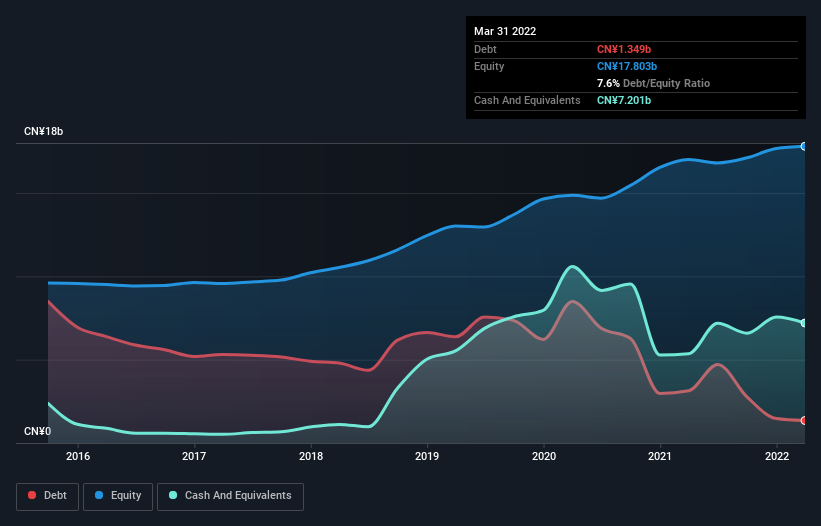
Warren Buffett famously said, 'Volatility is far from synonymous with risk.' It's only natural to consider a company's balance sheet when you examine how risky it is, since debt is often involved when a business collapses. As with many other companies Asia Cement (China) Holdings Corporation (HKG:743) makes use of debt. But is this debt a concern to shareholders?
What Risk Does Debt Bring?
Generally speaking, debt only becomes a real problem when a company can't easily pay it off, either by raising capital or with its own cash flow. If things get really bad, the lenders can take control of the business. However, a more frequent (but still costly) occurrence is where a company must issue shares at bargain-basement prices, permanently diluting shareholders, just to shore up its balance sheet. Having said that, the most common situation is where a company manages its debt reasonably well - and to its own advantage. When we examine debt levels, we first consider both cash and debt levels, together.
View our latest analysis for Asia Cement (China) Holdings
How Much Debt Does Asia Cement (China) Holdings Carry?
The image below, which you can click on for greater detail, shows that Asia Cement (China) Holdings had debt of CN¥1.35b at the end of March 2022, a reduction from CN¥3.13b over a year. But on the other hand it also has CN¥7.20b in cash, leading to a CN¥5.85b net cash position.

A Look At Asia Cement (China) Holdings' Liabilities
According to the last reported balance sheet, Asia Cement (China) Holdings had liabilities of CN¥2.21b due within 12 months, and liabilities of CN¥666.4m due beyond 12 months. On the other hand, it had cash of CN¥7.20b and CN¥2.17b worth of receivables due within a year. So it actually has CN¥6.49b more liquid assets than total liabilities.
This surplus liquidity suggests that Asia Cement (China) Holdings' balance sheet could take a hit just as well as Homer Simpson's head can take a punch. Having regard to this fact, we think its balance sheet is as strong as an ox. Succinctly put, Asia Cement (China) Holdings boasts net cash, so it's fair to say it does not have a heavy debt load!
It is just as well that Asia Cement (China) Holdings's load is not too heavy, because its EBIT was down 40% over the last year. When it comes to paying off debt, falling earnings are no more useful than sugary sodas are for your health. The balance sheet is clearly the area to focus on when you are analysing debt. But it is future earnings, more than anything, that will determine Asia Cement (China) Holdings's ability to maintain a healthy balance sheet going forward. So if you're focused on the future you can check out this free report showing analyst profit forecasts.
Finally, a business needs free cash flow to pay off debt; accounting profits just don't cut it. Asia Cement (China) Holdings may have net cash on the balance sheet, but it is still interesting to look at how well the business converts its earnings before interest and tax (EBIT) to free cash flow, because that will influence both its need for, and its capacity to manage debt. Over the last three years, Asia Cement (China) Holdings actually produced more free cash flow than EBIT. That sort of strong cash conversion gets us as excited as the crowd when the beat drops at a Daft Punk concert.
Summing up
While it is always sensible to investigate a company's debt, in this case Asia Cement (China) Holdings has CN¥5.85b in net cash and a strong balance sheet. And it impressed us with free cash flow of CN¥1.9b, being 102% of its EBIT. So we don't think Asia Cement (China) Holdings's use of debt is risky. There's no doubt that we learn most about debt from the balance sheet. But ultimately, every company can contain risks that exist outside of the balance sheet. For instance, we've identified 2 warning signs for Asia Cement (China) Holdings that you should be aware of.
At the end of the day, it's often better to focus on companies that are free from net debt. You can access our special list of such companies (all with a track record of profit growth). It's free.
New: Manage All Your Stock Portfolios in One Place
We've created the ultimate portfolio companion for stock investors, and it's free.
• Connect an unlimited number of Portfolios and see your total in one currency
• Be alerted to new Warning Signs or Risks via email or mobile
• Track the Fair Value of your stocks
Have feedback on this article? Concerned about the content? Get in touch with us directly. Alternatively, email editorial-team (at) simplywallst.com.
This article by Simply Wall St is general in nature. We provide commentary based on historical data and analyst forecasts only using an unbiased methodology and our articles are not intended to be financial advice. It does not constitute a recommendation to buy or sell any stock, and does not take account of your objectives, or your financial situation. We aim to bring you long-term focused analysis driven by fundamental data. Note that our analysis may not factor in the latest price-sensitive company announcements or qualitative material. Simply Wall St has no position in any stocks mentioned.
About SEHK:743
Asia Cement (China) Holdings
An investment holding company, manufactures and sells cement, concrete, and related products in People’s Republic of China.
Excellent balance sheet and slightly overvalued.
Similar Companies
Market Insights
Community Narratives



